Are you ready to tackle the holy grail of infused edible recipes? This tried and true, no-fail recipe for cannabis gummies made with oil is the perfect recipe for delicious CBD or THC gummies that do not sweat or separate. This guide includes options for different infused oils, flavorings, sugar-free options, and more.
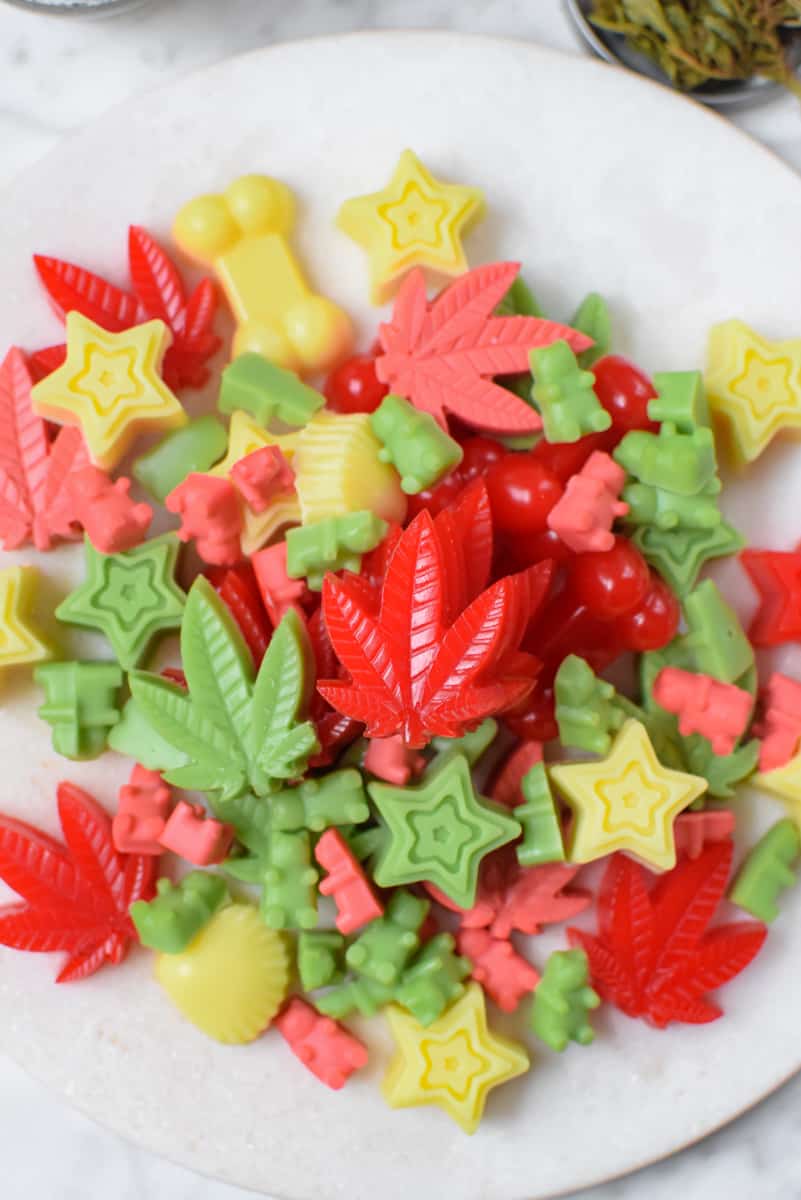
Table of Contents
Recipe Features
- A tried and true recipe with over 900+ 5-star reviews
- Easily customizable, this recipe can feature any color or flavor you want
- Want to make it easy? Skip the hard work and have my perfectly dosed Bliss Gummies containing 12.5mg THC each and have them delivered directly to your door – now shipping across the US!
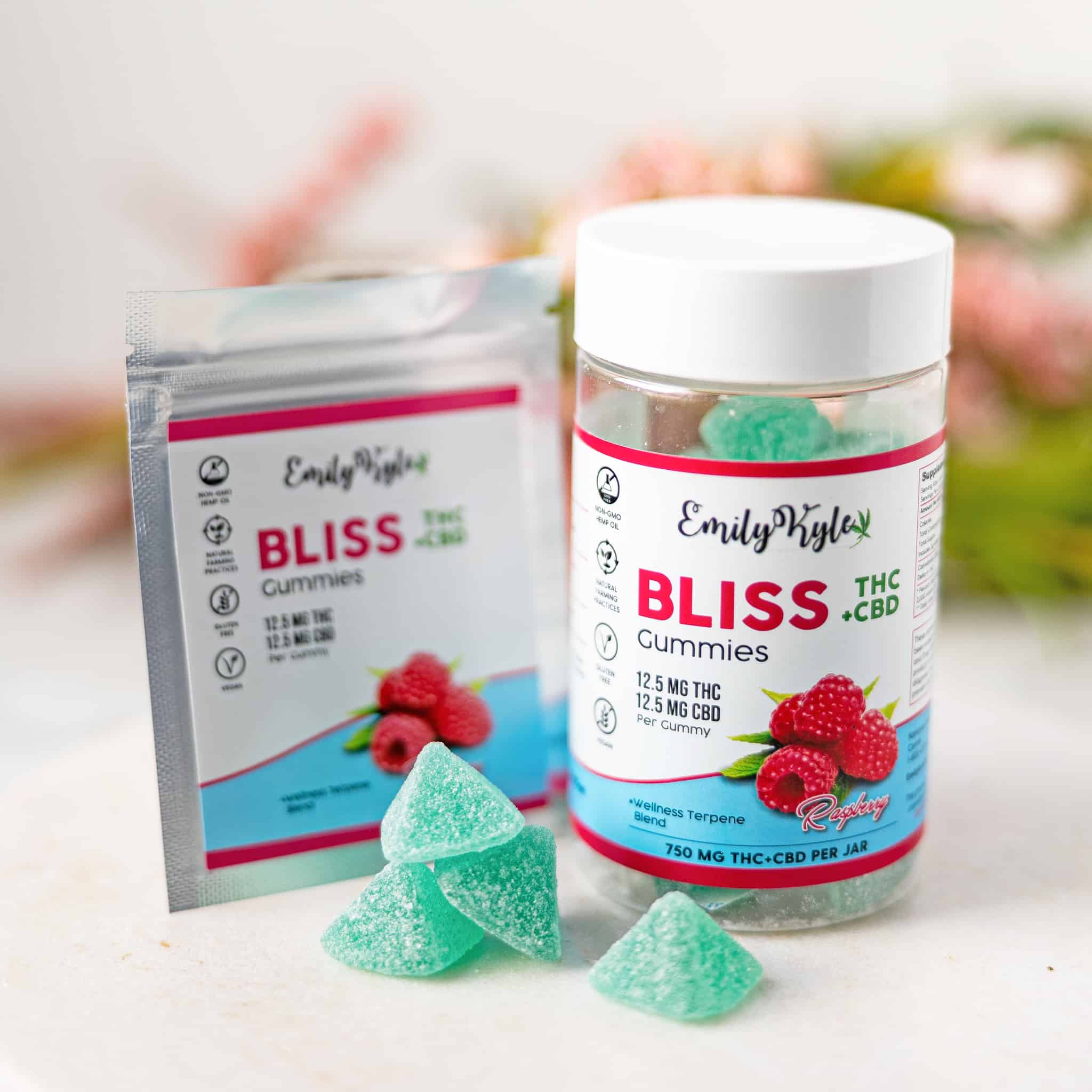
Why You Will Love This Recipe
Recently, a member of my Well With Cannabis Community told me that with so many cannabis gummy recipes available online – with different instructions and methods – it got overwhelming to pick the perfect one.
So, I tried them all and worked hard to put together this no-fail guide on making the perfect cannabis gummies with oil or butter.
By following these easy directions, you will create a delicious cannabis gummy with the perfect texture and consistency, with no separation or sweating.
Now, gummy taste and texture preferences are subjective, so I recommend you try this recipe with *non* cannabis-infused oil first.
That way, you know you like the taste and texture of this recipe before adding in your hard-earned cannabis products.
Also, you don’t have cannabis-infused oil or are looking for a gummy alternative, I also have these gummy recipes available:
- Easy Homemade CBD Gummies
- Cannabis Gummies made with Tincture, FECO or RSO
- How to Infuse Store-Bought Gummies with Tinctures
Okay – I think that’s everything you need to know before getting started.
Read on to find ingredient notes, step-by-step instructions, and fully answered FAQs to help you along the way!
What You’ll Need
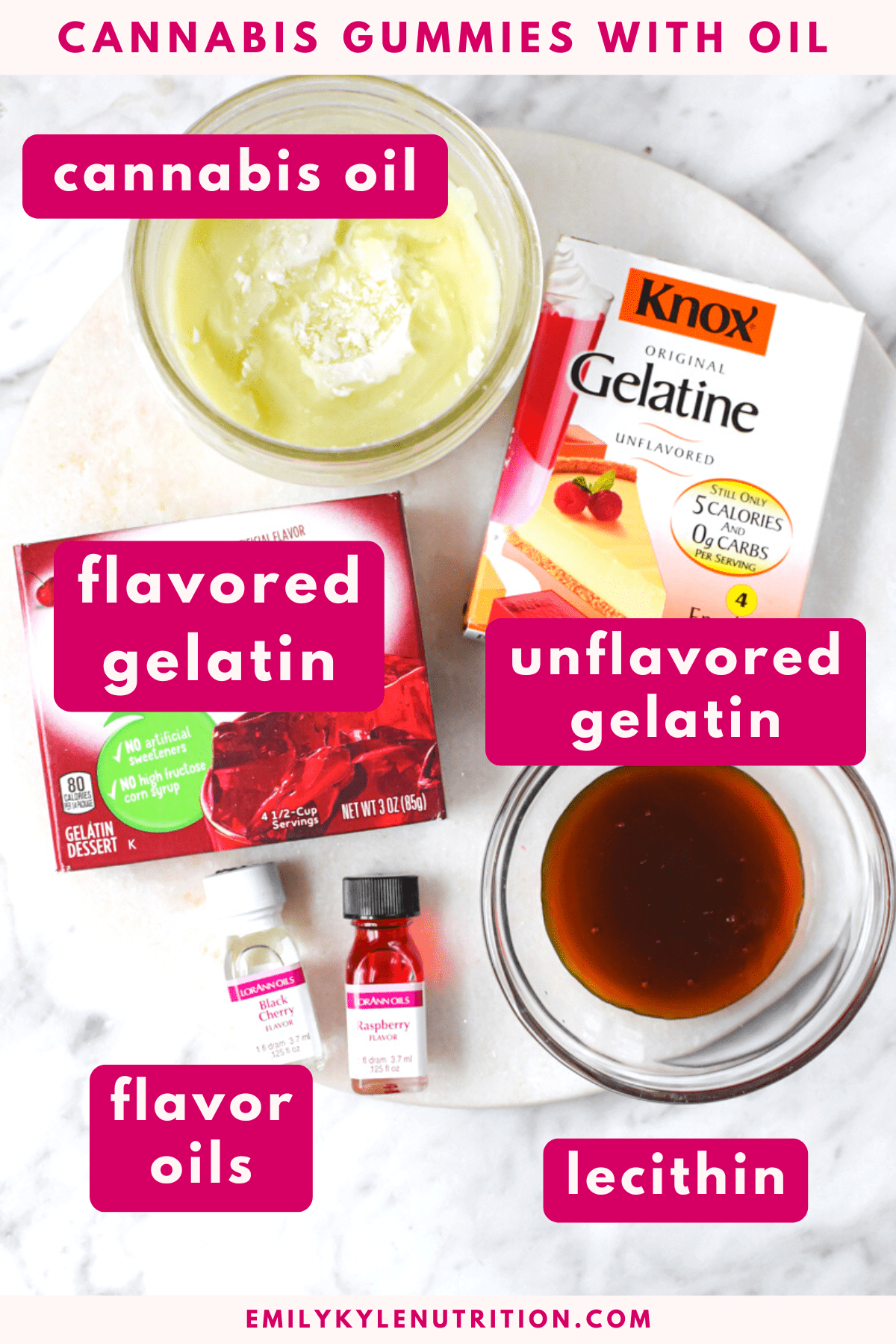
Helpful Equipment
- Measuring cups and spoons
- Small mixing bowl
- Small saucepan
- Double boiler
- Whisk
- Funnel
- Squeeze bottle
- Baking sheets
- Gummy bear molds *These 1mL molds will make approximately 355 gummy bears from this recipe.
- Cannabis leaf gummy molds *These 7mL molds will make approximately 51 gummy leaves from this recipe.
Ingredients
- 1 cup water or juice – juice adds more flavor, but it is also more susceptible to mold.
- ¾-1¼ ounces – For this recipe, we will be using ¾-1¼ ounces of unflavored gelatin, equivalent to 3-5 Knox packs. See notes below to decide how much to use. This recipe will not work without adding gelatin.
- ½ cup of cannabis-infused oil – I’ve covered every type of cannabis-infused oil or butter you can use below. Just pick your preference and get cooking.
- 2 teaspoons lecithin – Lecithin is used as a binder to keep the oil and water together. You can use liquid, granulated, or powdered form. If you skip this ingredient, your gummy’s will separate and leave a hard film of oil on the bottom.
- 1 teaspoon lemon juice – or ¼ teaspoon of an alternative mold inhibitor like Lorann mold inhibitor or potassium sorbate.
- 3 ounces flavored gelatin – Any flavor you want! Note that flavored gelatin typically comes in two different package sizes, a 3-ounce and 6-ounce package. For this recipe, we will be using one 3-ounce package.
- 5-10 drops of flavoring oils – Available in a wide variety of flavors, these oils can help mask the cannabis taste and make the flavor pop.
Note: A printable list of ingredients with amounts and instructions is located in the recipe card below.
Step-by-Step Instructions
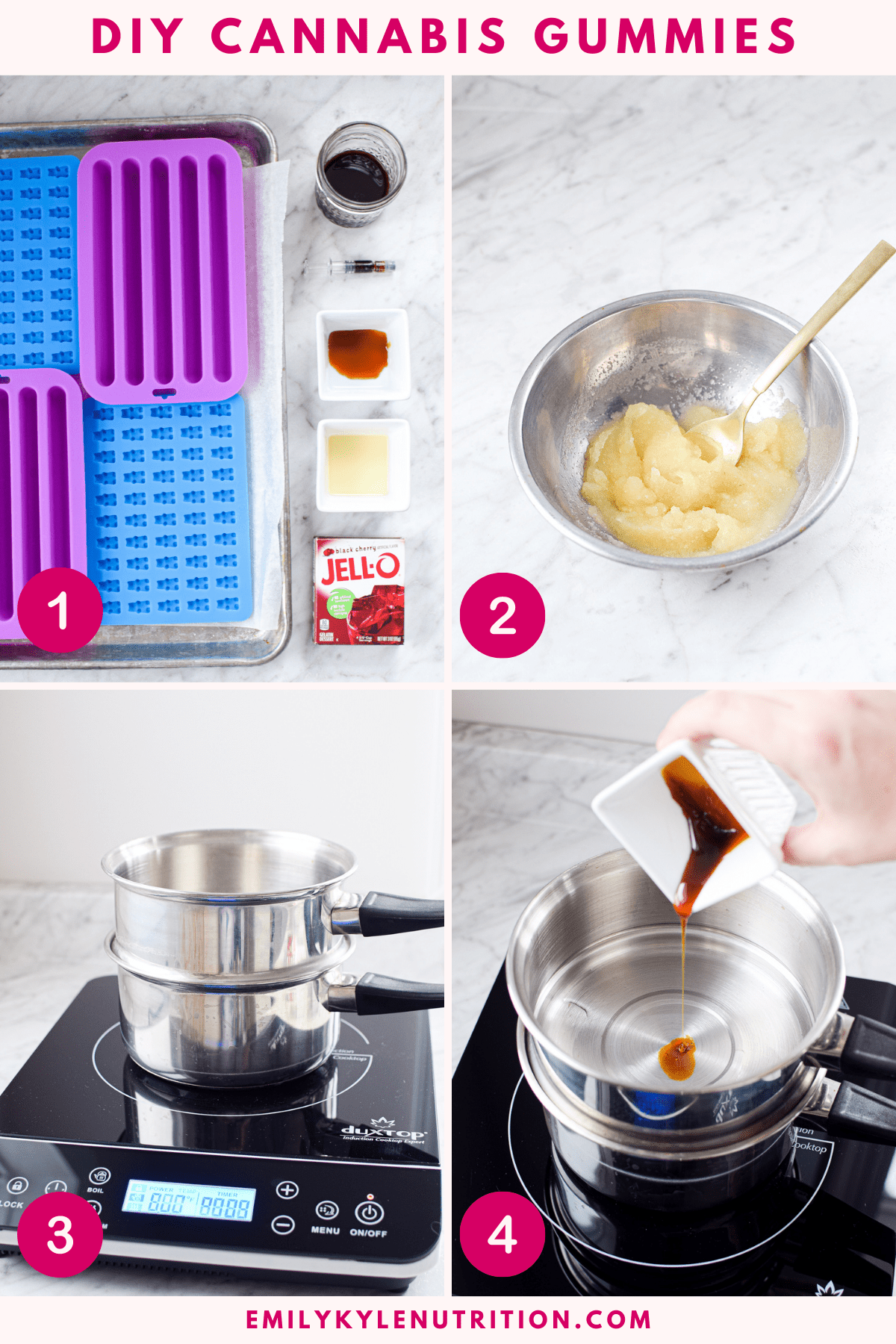
- Step 1 – Prepare your workstation before getting started; this recipe moves quickly. Gather your equipment and measure out your ingredients. Place your gummy molds on baking trays, so they don’t flop when being moved.
- Step 2 – In a small bowl, add ½ cup of water or juice. Stir the unflavored gelatin into the liquid. This is called blooming the gelatin. The mixture will become very thick. Set this aside.
- Step 3 – Next, prepare a double boiler by putting one cup of water in the bottom pan. Add the top pan and place over medium-high heat. Once near boiling, turn the heat to low and let simmer.
- Step 4 – Add the cannabis oil (or cannabutter) and lecithin to the top of the double boiler. Allow butter or oil to melt as needed, and then whisk to incorporate. Leave over low heat while working on the next step.
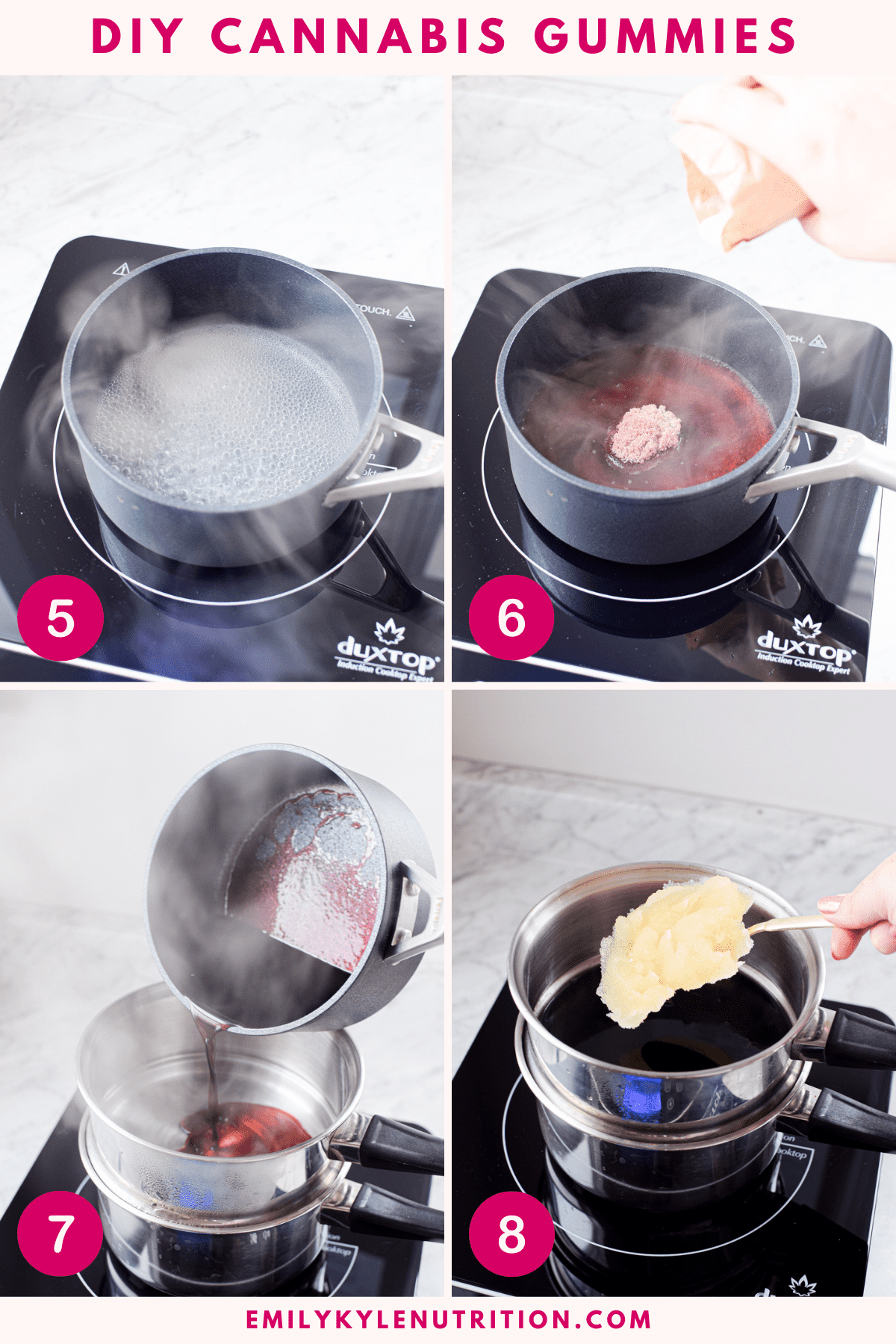
- Step 5 – Add the remaining ½ cup of water or juice to a separate small saucepan on the stove. Turn the heat to medium-high and bring to a boil.
- Step 6 – Once boiling, add the lemon juice or mold inhibitor and the flavored gelatin packet to the hot liquid. Whisk well to dissolve. Turn off the heat.
- Step 7 – Carefully and slowly, pour the flavored gelatin mixture into the double boiler that contains the melted oil (or cannabutter) and lecithin. Whisk consistently until all ingredients are incorporated.
- Step 8 – Take the reserved bowl of bloomed gelatin and add it to the double boiler.
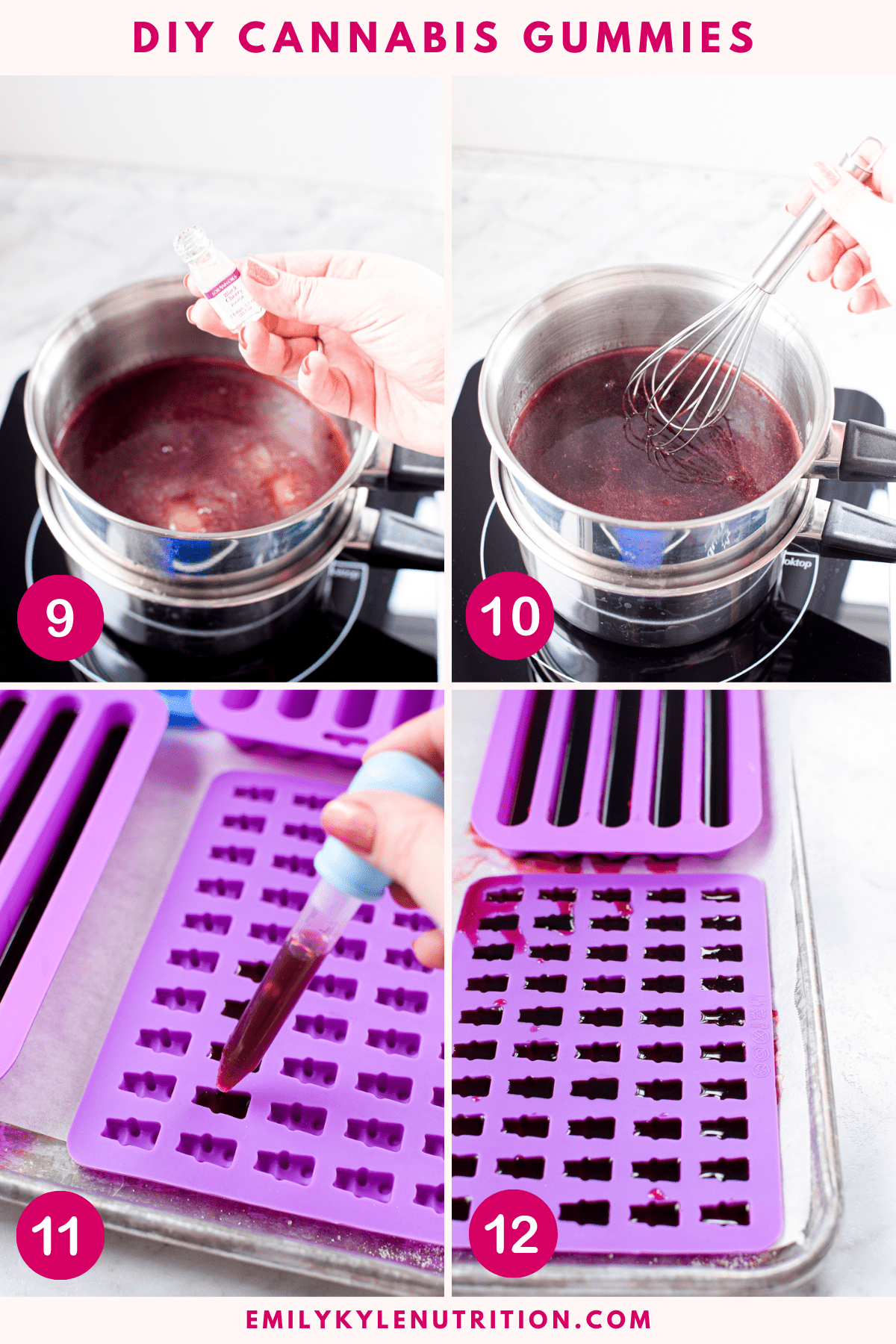
- Step 9 – Add your desired amount for flavoring oil drops.
- Step 10 – Whisk consistently for 10 minutes, ensuring no clumps form. This step is very important! You can use a hand mixer or an immersion blender to speed up the process if desired. After 10 minutes of whisking, turn off the heat.
- Step 11 – Working quickly, using a squeeze bottle, pipette, or piston funnel, add the gummy mixture to your gummy molds of choice. If your mixture becomes too cool or thickens too much, you can turn the heat back to low and stir well to let it soften back up.
- Step 12 – Once filled, allow the molds to sit and set for at least 30 minutes at room temperature, or in the refrigerator, before attempting to remove the gummies from the molds. If they are not fully set after 30 minutes, wait another 30 minutes.
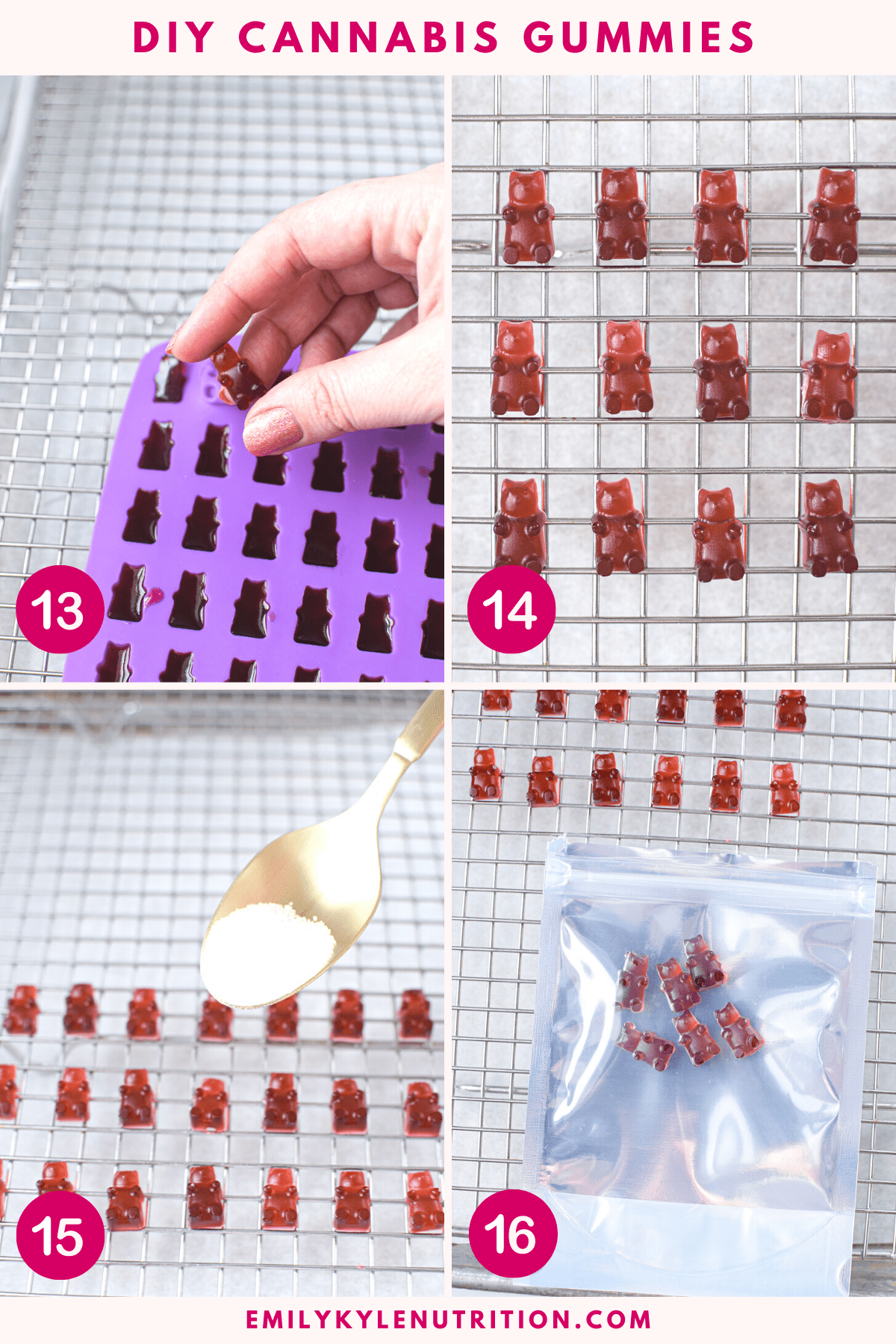
- Step 13 – Carefully remove the gummies from the molds. Decide whether you want to store them in the fridge immediately or allow them to air dry.
- Step 14 – If air drying, place the gummies in a single layer on a wire baking rack. Allow the gummies to dry at room temperature for 12-72 hours, depending on your texture preferences. *See air drying notes below.
- Step 15 – If you plan to add sugar or citric acid to your gummies, do so after they have been fully air-dried. Do not try to do this immediately after they come out of the molds, they will melt.
- Step 16 – Store in an airtight container and enjoy!
Note: complete step-by-step printable instructions are located in the recipe card below.
Storage Instructions
Once removed from the gummy molds, you can either air-dry these gummies or simply store them in an airtight container in the refrigerator for up to two weeks.
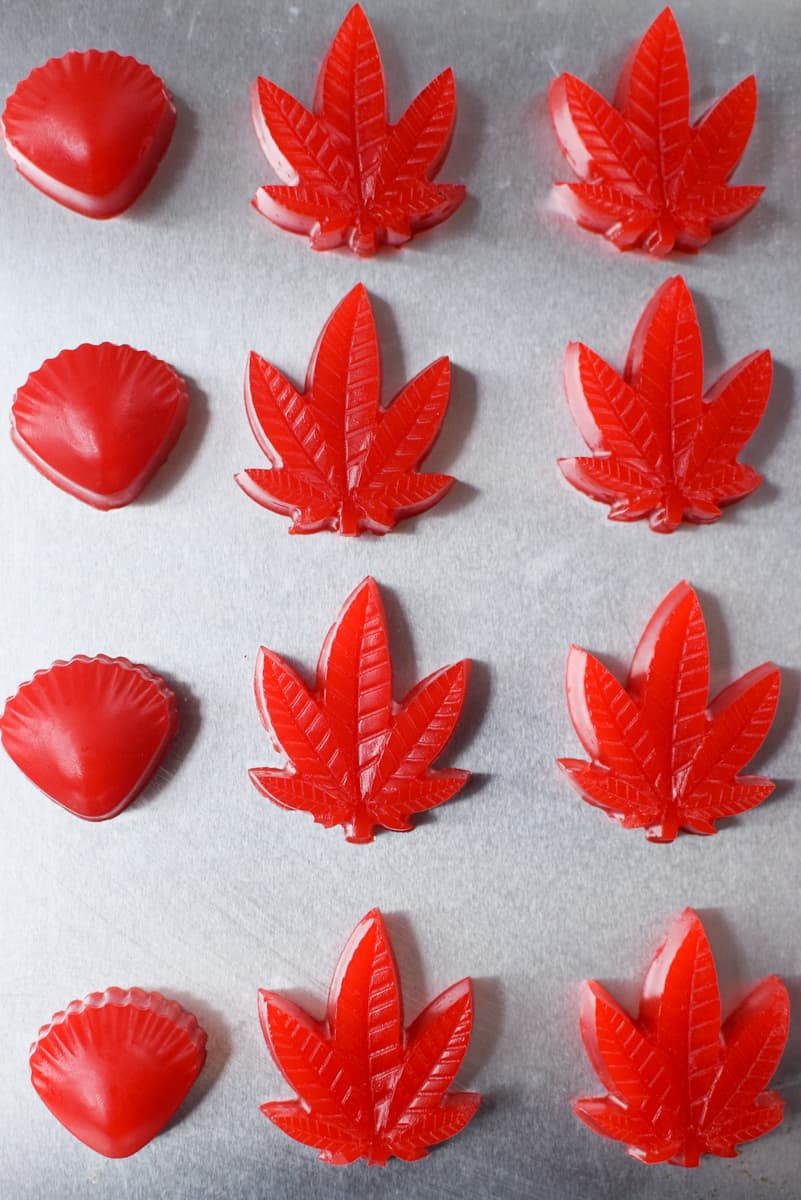
How To Air Dry Cannabis Gummies
While it’s an extra step, many people prefer to air dry their gummies for enhanced texture, less moisture, and better shelf stability.
To successfully air dry, or cure, the cannabis gummies, you first need to remove them from the molds.
Once free from the molds, you can place them on a wire baking rack, parchment paper, or a paper towel. Allow these gummies to dry at room temperature for 2-48 hours.
The time frame is your choice based on your preferred texture and consistency. Try one every few hours to find what you like best.
Many people will drape a piece of cheesecloth over the gummies to prevent any contaminants from falling on them. If you do this, ensure you are using a breathable fabric.
If you have a food dehydrator available, you can place the gummies to speed up the process.
Note: If you use a food dehydrator to dry your gummies, you must ensure it does not use heat. Low-temperature dehydrators (~90°) will cause your gummies to melt.
Finally, some people prefer to lightly dust their air-dried gummies with a small amount of cornstarch to remove any last bits of moisture.
A Word of Caution
Humidity will cause an issue of oil sweating if you air-dry your gummies, especially if they are made with MCT oil.
If it is humid where you live, you must air dry your gummies in the refrigerator, where the temperature and humidity are better controlled.
If you use a food dehydrator to dry your gummies, you must ensure it does not use heat. Low-temperature dehydrators (~90°) will cause your gummies to melt.
Alternate Oil Infusion Options
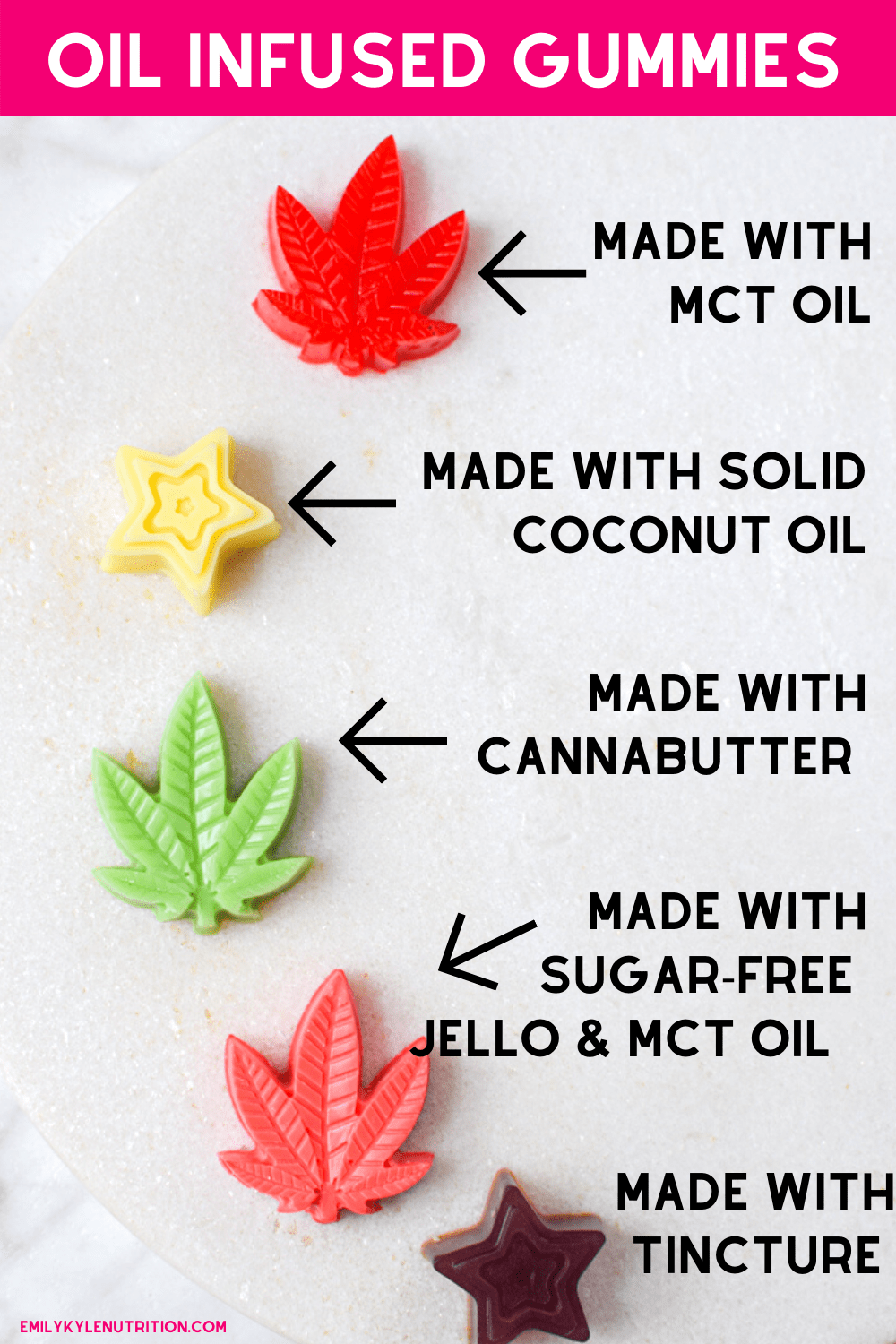
As you can see from the visual above, your gummies’ final texture and appearance will vary slightly depending on what type of ingredients you use.
Below I will go over all the infusion options that will work with this recipe in detail, including the pros and cons of each option.
Infused MCT Oil
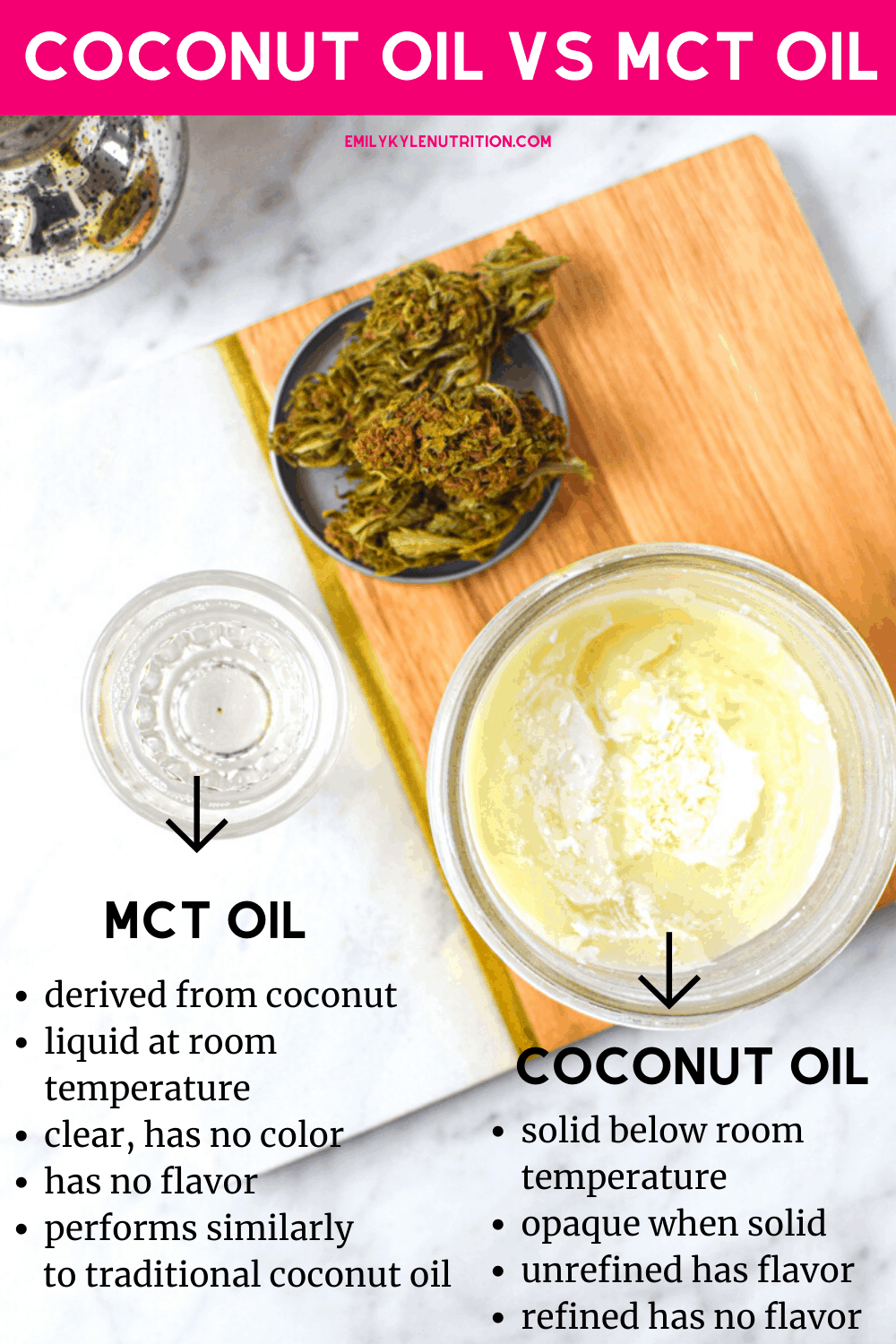
Our favorite option for making these gummies is to use a cannabis-infused MCT oil.
Many people prefer liquid MCT oil for infusions because it is tasteless, remains liquid at room temperature, is completely clear with no color, and has no flavor.
Using infused MCT oil for your infusion will result in a more clear gummy that is less dense and more ‘jiggly’ than a gummy infused with traditional coconut oil.
If you haven’t made MCT cannabis oil yet, click here for full instructions. You will need to have this ready before starting the gummy-making process.
Infused Coconut Oil
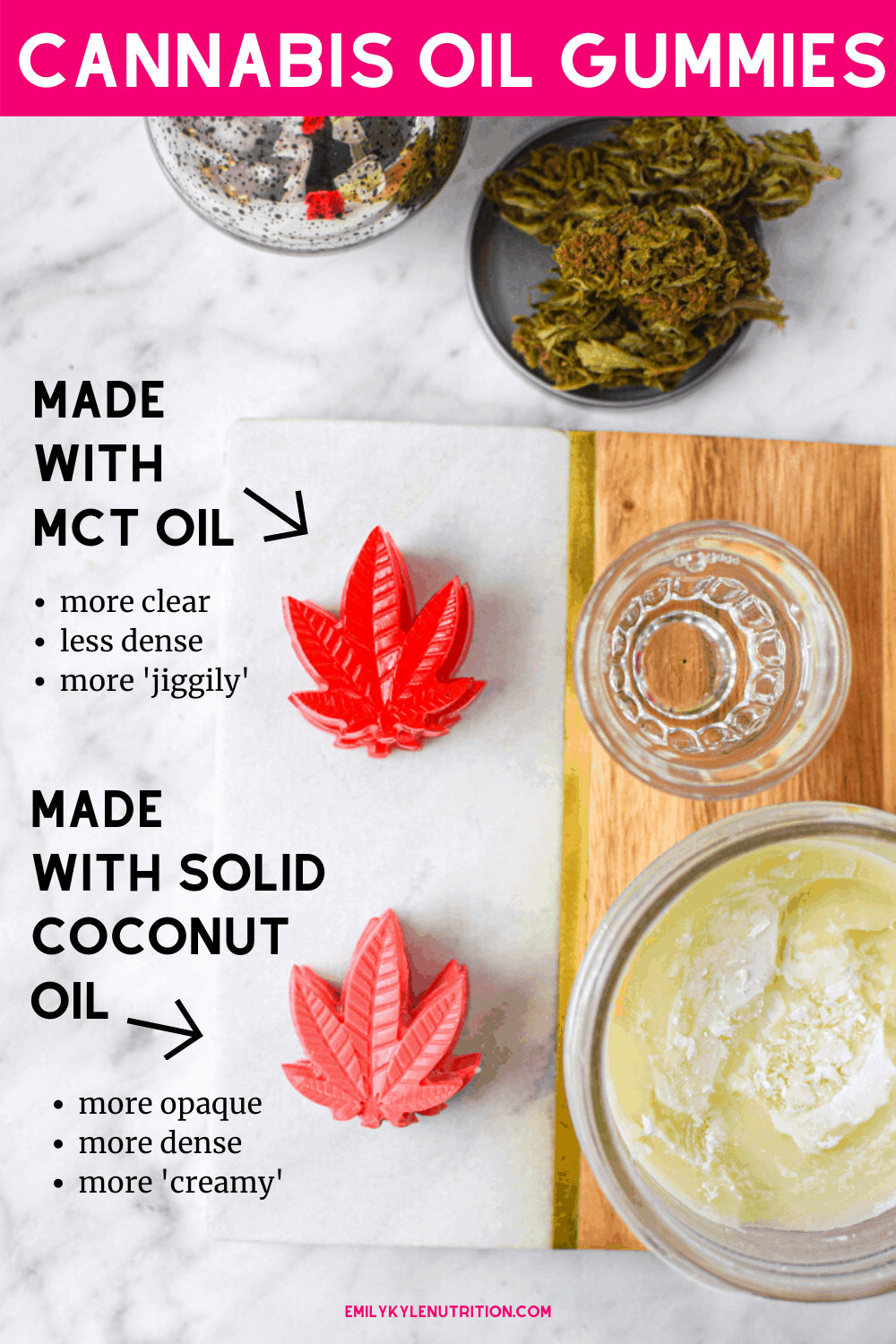
Our next favorite option for making infused gummies is traditional cannabis-infused coconut oil.
Coconut oil remains solid at room temperature, is opaque in color, and has two primary options: unrefined and refined.
Many people prefer refined coconut oil because it has a less prominent coconut taste.
As noted in the image above, when gummies are made with traditional coconut oil, they tend to be more opaque in appearance, are slightly more dense in texture, and have an almost creamy texture and mouthfeel.
Gummies Made with Cannabutter
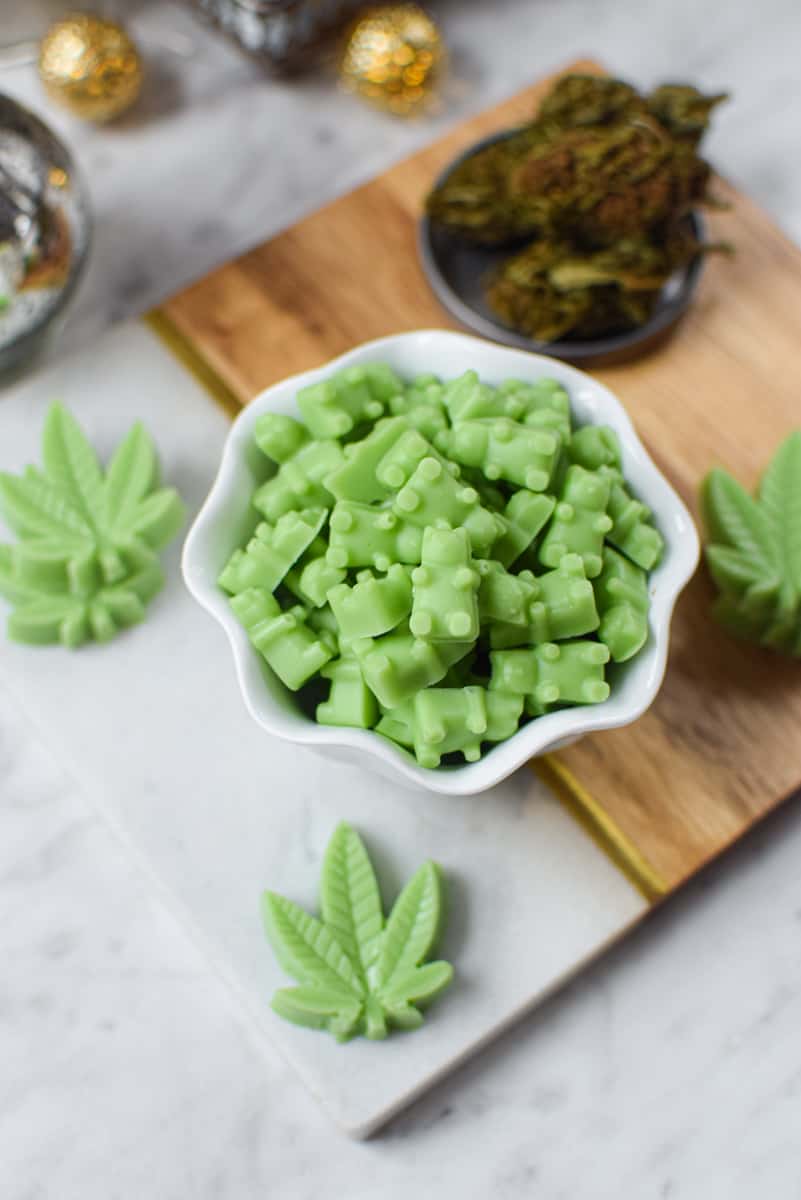
These gummies work perfectly when made with cannabutter in place of MCT or coconut oil.
However, they had a much noticeably strong cannabis taste compared to the previous two options. They also had a creamier mouthfeel, similar to the coconut oil gummies.
I paired them with lime-flavored gelatin, which worked well for color and taste. If you’re interested in making cannabutter, I have a step-by-step crockpot recipe or Instant Pot recipe.
Other Cannabis-Infused Oils
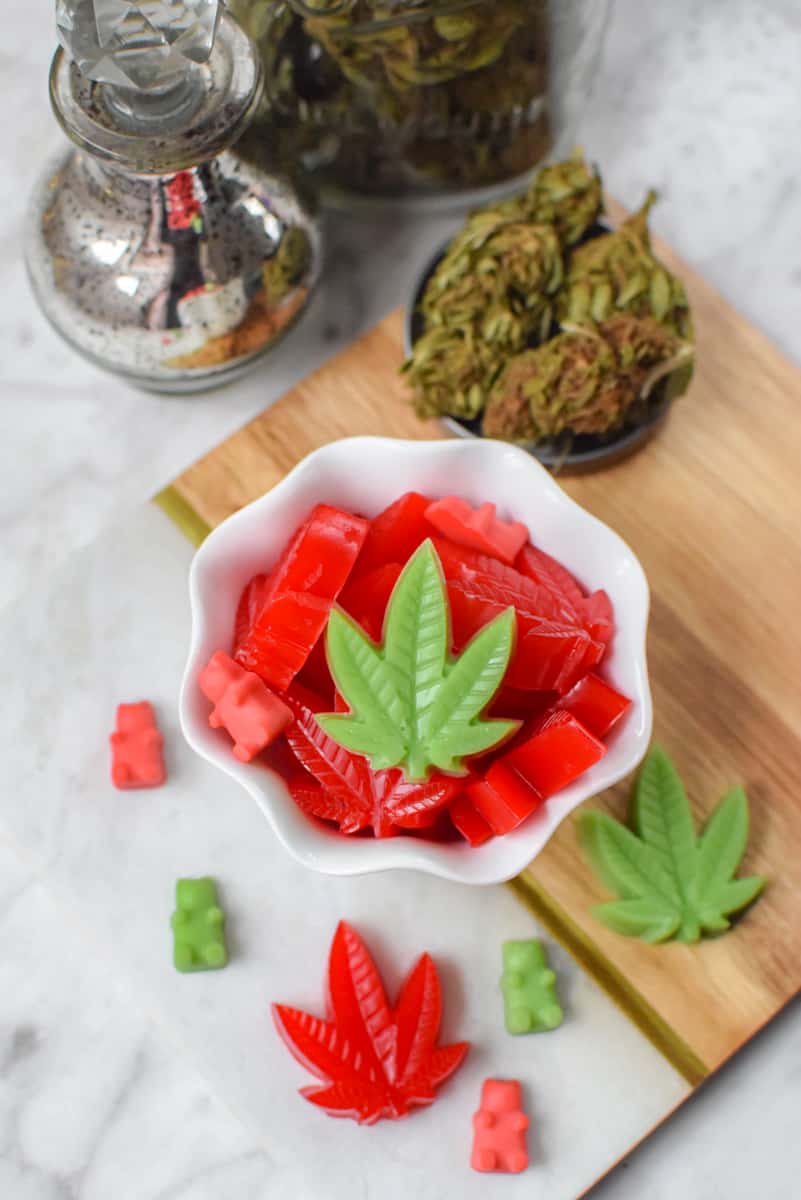
Whether allergic to coconuts or simply looking for a different oil to infuse, this recipe will work with just about any cannabis oil you desire.
The only caveat is that you risk absorbing any flavors from your oil, especially with stronger oils like hemp seed oil or olive oil.
You can try the following cooking oils to experiment with: avocado oil, sunflower seed oil, grapeseed oil, canola oil, soybean oil, safflower oil
Notes & Expert Tips
- Test batch: As always, I recommend you make one *non-infused* test batch of gummies before trying with your actual product to ensure you like the taste, consistency, and process. This means using regular coconut oil instead of cannabis coconut oil, etc.
- Unflavored gelatin: Using butter or solid coconut oil, use ¾ ounce (3 packs) of Knox gelatin. If you use liquid oil, such as MCT oil, use 1 ounce (4 packs) of Knox gelatin.
- Mold inhibitors: You can also use ¼ teaspoon of LorAnn Mold Inhibitor or potassium sorbate instead of the lemon juice if you need a longer shelf life.
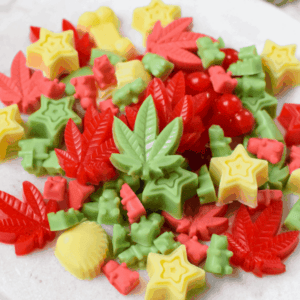
Cannabis Gummies Made With Oil or Butter
Equipment
Ingredients
- 1 cup water or juice divided
- 1 ounce unflavored gelatin *see notes below
- ½ cup Bliss cannabis oil or cannabutter
- 2 teaspoons lecithin powder or liquid
- 1 teaspoon lemon juice or mold inhibitor *see notes below
- 3 ounces flavored gelatin 1 small box
- 10 drops LorAnn super-strength flavoring oils
Instructions
- Prepare your workstation before getting started; this recipe moves quickly. Gather your equipment and measure out your ingredients. Place your gummy molds on baking trays, so they don't flop when being moved.
- In a small bowl, add ½ cup of water or juice. Stir the unflavored gelatin into the liquid. This is called blooming the gelatin. The mixture will become very thick. Set aside.
- Next, prepare a double boiler by putting one cup of water in the bottom pan. Add the top pan and place over medium-high heat. Once near boiling, turn the heat to low and let simmer.
- Add the cannabis oil (or cannabutter) and lecithin to the top of the double boiler. Allow butter or oil to melt as needed, and then whisk to incorporate. Leave over low heat while working on the next step.
- Add the remaining ½ cup of water or juice to a separate small saucepan on the stove. Turn the heat to medium-high and bring to a boil.
- Once boiling, add the lemon juice or mold inhibitor and the flavored gelatin packet to the hot liquid. Whisk well to dissolve. Turn off the heat.
- Carefully and slowly, pour the flavored gelatin mixture into the double boiler that contains the melted oil (or cannabutter) and lecithin. Whisk consistently until all ingredients are incorporated.
- Take the reserved bowl of bloomed gelatin and add it to the double boiler.
- Add your desired amount for flavoring oil drops.
- Whisk consistently for 10 minutes, ensuring no clumps form. This step is very important! You can use an immersion blender to speed up the process if desired. After 10 minutes of whisking, turn off the heat.
- Working quickly, using a squeeze bottle, pipette, or piston funnel, add the gummy mixture to your gummy molds of choice. If your mixture becomes too cool or thickens too much, you can turn the heat back to low and stir well to let it soften back up.
- Once filled, allow the molds to sit and set for at least 30 minutes at room temperature, or in the refrigerator, before attempting to remove the gummies from the molds. If they are not fully set after 30 minutes, wait another 30 minutes.
- Carefully remove the gummies from the molds. Decide whether you want to store them in the fridge immediately or allow them to air dry.
- If air drying, place the gummies in a single layer on a wire baking rack. Allow the gummies to dry at room temperature for 12-72 hours, depending on your texture preferences. *See air drying notes below.
- If you plan to add sugar or citric acid to your gummies, do so after they have been fully air-dried. Do not try to do this immediately after they come out of the molds, they will melt.
- Store in an airtight container and enjoy!
Notes
- Run a test batch first: I recommend you make one *non-infused* test batch of gummies before trying with your actual infusion to ensure you like the process, taste, and consistency of the final product. This ensures no good stuff gets wasted.
- Unflavored gelatin: If you are using butter or solid coconut oil, use 3/4 ounce (3 Knox packs) of gelatin. If you are using a liquid oil, such as MCT oil, use 1 ounce (4 Knox packs) of gelatin. If you want an extra firm gummy, use 1¼ ounce (5 Knox packs) of gelatin.
- Lecithin: You can use powdered or liquid lecithin in the exact same amount. If your infused oil was already made with lecithin, you should still add the additional lecithin called for in this recipe.
- Mold inhibitors: You can also use a ¼ teaspoon of LorAnn Mold Inhibitor or potassium sorbate in place of the lemon juice for longer shelf stability.
- When air drying: Humidity will cause an issue of oil sweating if you are air-drying your gummies, especially if they are made with MCT oil. If you use a food dehydrator to dry your gummies, you must ensure it does not use heat.
Nutrition
Frequently Asked Questions
This depends on the size of your molds. This recipe makes 355mL total volume. If you have the tiny 1mL gummy bear molds, this recipe will make approximately 355 gummy bears. If you have larger 7mL cannabis leaf molds, this recipe will make 51 gummies.
Yes, you can easily freeze them. Freezing gummies does not alter the potency and may even help preserve potency.
Yes! We made these gummies with sugar-free flavored gelatin, which was fine. Simply swap a 0.3oz packet of sugar-free gelatin for the traditional 3oz packet of regular flavored gelatin. The weight difference comes from the lack of regular sugar.
Yes, but only after they have been cured or air-dried for at least 24 hours. If you try to coat them in sugar before air drying, they will melt and turn into a wet soupy mess.
I prefer liquid sunflower lecithin because I feel it mixes in better. Many members of my Well With Cannabis Community report that powdered lecithin works great in this recipe.
No problem! You can create a makeshift one by placing a heat-safe bowl over a pot of simmering water. This DIY method works like a charm for gentle heating without direct contact.
If you want to skip the flavored gelatin, add a sweetener.
No. Gelatin is a colorless, flavorless, protein-based ingredient that helps to create the gummy texture we are looking for in this recipe. It can easily be found in the baking section of your local grocery store or purchased on Amazon.
They’re not 100% necessary, but for those who want the extra flavor boost to help cover the taste of the cannabis in the gummies, these super-strength flavoring oils are the perfect addition.
Buy Gummies Now
If you would prefer to skip the cooking process and purchase gummies, I have delicious THC Bliss, CBD Revive, CBN Sleep, and CBG Focus gummies available for purchase in my online shop.

More Recipes You Will Love
Cannabis Dessert Recipes
Chewy Homemade Cannabis Caramels
Cannabis Dessert Recipes
Quick & Easy Cannabis Chocolates
Cannabis Dessert Recipes
Sweet, Creamy Cannabis Buttermints
Cannabis Dessert Recipes

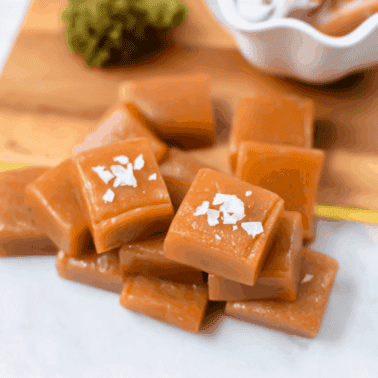
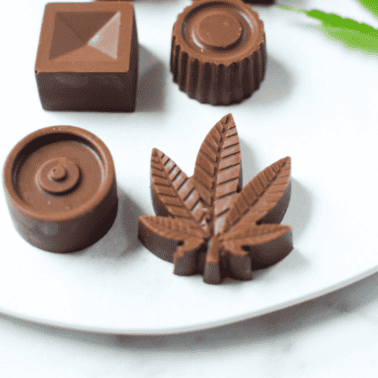
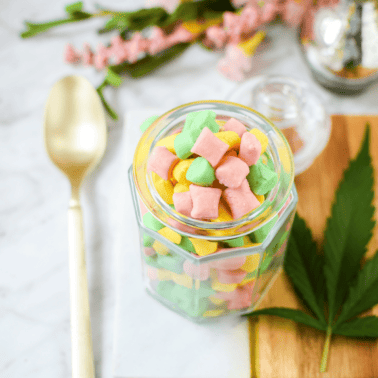
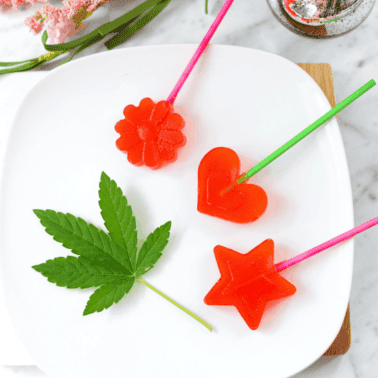
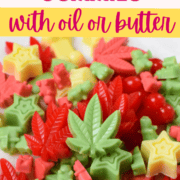








Hello, I love this recipe but I haven’t been able to add any sugar! I’ve made this 3 times with the butter and waited 72 hrs then put sugar the sugar on and they still melts. So what is it that I need to do or not doing? I just put the sugar on as I eat them now.
Hey Denise! Thanks so much for giving the recipe a try; I’m sorry you’re having trouble with the sugar. I haven’t experimented with sugar-coating step much, but have been successful after air drying, so I’m afraid I can’t give another suggestion at this time. I will play around with the sugar-coating stage and see if I can come up with any better instructions 🙂
Hi, in response to Denise’s question try lightly spraying the gummies with alcohol, leave for a few minutes and then roll them in sugar. I’ve heard this works! ??
That is really sweet of you to offer your thoughts to Denise, thank you Jane 🙂
Maybe use a coarser sugar not regular sugar.. Just a thought…
Thanks for sharing your thoughts, Jeanette!
How many gummies does this recipe make….I know my molds are different sizes, I just wanted a guesstimate so I can adjust the amount of cannibutter to use vs plain and gauge the strength of each gummy…..because if I use 1/2 cup of my cannibutter in this recipe I think my gummies would be way too strong..
Hi there Jeanette, this recipe makes approximately 12 fluid ounces which is approximately 355mL. If you use a tiny gummy bear mold that only holds 2mL, you will have 177 gummies. If you use a larger mold, like the cannabis leaf that holds 7mL, you would have approximately 50 gummies.
I think we should call molde inhibitors what they are, preservatives. Being a skincare formulator we should not be afraid of knowing which preservatives and ratios (%) are safe for each preparation. I believe in this recipe lemon juice is not going to stop the mold from growing but a good preservation, food safe, natural and approved one. Like potassium sorbate. But we would have to have a recipe in percentages to do adjust it to .5%. I’m going to try it.
Monica, the mold inhibitor is the name of the specific product I recommend along with potassium sorbate in the notes section of the recipe 🙂